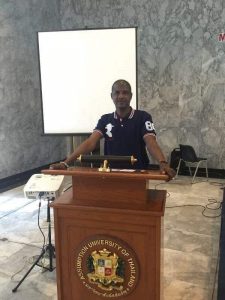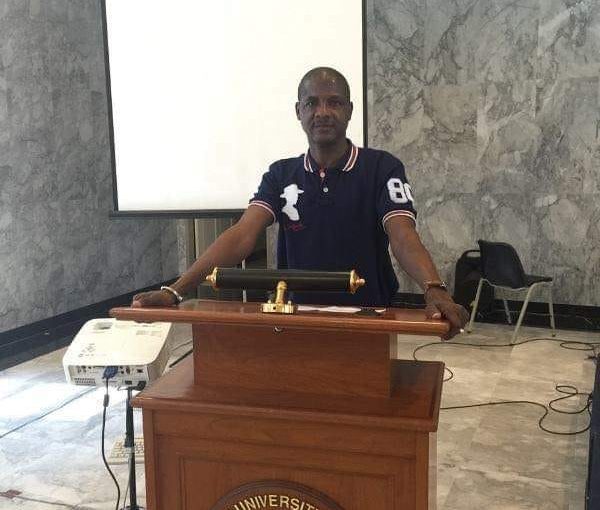 Alagi Yorro Jallow.
Alagi Yorro Jallow.Fatoumatta: Today, 806 years ago, I remember the creation of one of the most outstanding also the most remarkable documents to ever come from the hands of man. The Magna Carta. The great Charter of liberties. June 15, 1215. It was (is) an iconic document described as “the greatest constitutional document of all times, the foundation of the individual’s freedom against the arbitrary authority of the despot’. It was made by the Arch-Bishop of Canterbury to settle disputes between the King and the barons but ended up serving larger purposes to date.
Despite its near perfection, the Magna Carta was amended several times with blood ever since the authoritarian King John, for whose excesses it was made, first placed his seal on it. Anybody who keeps telling us that we had made a constitution and let us live with it needs to read the wars it took to fine-tune the Magna Carta, bloody wars that would draw in successive ArchBishops of Canterbury, successive Popes, and successive Kings.
We will change our constitution and our institutions several times as we wish, whether anybody likes it or not, because we gave it to ourselves and the future generations. However, today, I wanted to talk about President Adama Barrow and the supreme crises facing our Country. Every student who honestly sat in an economics class must have learned Adam Smith’s theory of the invisible hand (of self-interest), just as every student who sat in a political science class and I believed Adama Barrow must have learned about the American Civil war (1861-1865), the legendary Gettysburg address and the first-ever Republican president, Abraham Lincoln. If he forgets, I want to remind him.
To strengthen their democracy and way of life, Americans, while still approximately 32 million people and 34 states, fought the most brutal and bloodiest war ever done on American soil. By the time the last brutal battle was fought and lost at Appomattox Court House, among other places, 620,000 Americans lay dead. Brother rose against brother, neighbor against neighbor.
However, President Lincoln decided to heal his nation out of the massive flow of blood. As a result, Americans remember less the bloody war more than they remember his words that day. However, unfortunately, the British would also have their civil war for nearly ten years (1642 – 1651).
President Abraham Lincoln recognized the healing power of words after a great division. He rallied his nation to the flag in words I have never known how to quote partially: “Four score and seven years ago, our fathers brought forth on this continent, a new nation, conceived in Liberty and dedicated to the proposition that all men are created equal.
Now we are engaged in a great civil war, testing whether that nation or any nation so conceived and so dedicated can long endure. We are met on a great battlefield of that war. We have come to dedicate a portion of that field as a final resting place for those who here gave their lives that that nation might live. It is altogether fitting and proper that we should do this.
However, we can not dedicate in a larger sense — we can not consecrate – we can not hallow — this ground. However, the brave men, living and dead, who struggled here, have consecrated it far above our insufficient power to add or detract.
The world will little note, nor long remember what we say here, but it can never forget what they did here. However, instead, it is for us the living to be dedicated here to the unfinished work which they who fought here have thus far so nobly advanced. It is instead for us to be here dedicated to the excellent task remaining before us — that from these honored dead we take increased devotion to that cause for which they gave the last full measure of devotion — that we here highly resolve that these dead shall not have died in vain — that this nation, under God, shall have a new birth of freedom — and that Government of the people, by the people, for the people, shall not perish from the earth.”
Fatoumatta: Here, we have a nation divided by hate, corruption, tribalism, and impunity, the “Us vs. Them” Mentality. Adama Barrow and his estranged Godfather Ousainou Darboe and their supporters will be busy issuing national security threats and with more threats and insecurity as we are heading to December 4 elections. The people’s will should always be reflected in an election, and people should learn to accept results. That is the most important thing. That is the message we have for Africa, the Gambia particularly. Let us accept the will of the people. There can only be one winner. After you win, please do not gloat; you perform. So you allow your friend who has succeeded to perform. Then, when another election comes, you will have a go at it. This statement above reflects our desire to see an Africa, particularly the Gambia, characterized and riddled by the post-election political impasse in 2016. However, it is not by any way a call to political players in the Gambia not to feel aggrieved about losing an election because everywhere in the world, losing elections has never been without one party feeling aggrieved.
As the Gambia head to the Presidential election on December 4, we instead call to magnanimity and patriotism and a call for all political players to rise above their hurt and embrace the virtue of utmost self-restraint. It is a clarion call to all political players that even where they feel entitled to an election victory that has gone the other way, they should not be allowed to risk the peace of the Country and the continent. One great son of Africa, Prof. Wole Soyinka, has said: “No one is rich enough to buy yesterday, but if you hustle hard, tomorrow could be yours.” Thus, rather than engaging in violent political activities that fuel instability while seeking to change yesterday, it would be more beneficial to invest our energies in the potential of tomorrow founded on the peace of today, which is itself anchored on the ultimate love of the land.
Fatoumatta: Thus, we call to Gambians, but generic and intended to apply to the entire continent in line with politicians’ calls of yesteryears. However, this act of statesmanship has been entirely misconstrued by some sections of our society and media houses who have chosen to use this as the basis for inciting hate speech and tribalism. It is apparent that in a democracy like ours, the independent press can freely express their opinions on national matters. Still, within that ambit, there is an inherent responsibility to uphold the virtues of responsible journalism. A journalist that usurps the privilege of self-expression needs to be rebuked and encouraged to practice self-analysis in the nation’s interest.
Everyone who jokes with the lives of Gambians will face the full force of the law or have enough tear gas threats, threats, threats. Threats never built a nation. Many times we harden people. Instead of coming to make a powerful oration and appeal for brotherhood, for nationhood, and for a collective effort to fight tribalism and corruption, our politicians will issue threats and hate speech. The Government should continue to uphold our long-cherished values of respecting and protecting freedom of speech and individuals’ rights to self-expression and information. But at the center of that freedom should be responsibility, self-restraint, and patriotism. Freedom of expression cannot and should not be allowed to crowd our judgment and influence on our collective responsibility to respect other nations’ Sovereignty.
In the era of modern diplomacy, we have ceased to rely on war words to settle disputes. The art of self-restraint has gained momentum and forged a new world order that heavily hinges on people who can handle awkward situations without upsetting any side. Patriotism is always glorified in international diplomacy because the patriot thinks first of his Country and later of himself. A sagacious diplomat cannot show more extraordinary passion for his motherland than by carrying national interests through his speech and self-interrogation. In this regard, a great responsibility rests upon our statesman, not only to enjoy his right to self-expression and right to information but also to maintain the confidence and trust of the people of the world and forge international relationships that focus on the growth and peace of our land.
Fatoumatta: PresidentBarrow’s Government should remain committed to international diplomacy, good governance, and the rule of law and ensure that elections are conducted in a free, fair, and credible manner and conducted on a level playing field. Elections are won or lost based on ideas and the character of those tasked with explaining those ideas to the electorates.
The Gambia is renowned for its democratic and diplomatic credentials. President Barrow must remain fully committed to maintaining these democratic standards and principles of Gambian democracy. The Gambia may not be everyone’s first choice, but we are a great choice. We may not be perfect, but we need not be because only the Almighty God, the omnipotence, is excellent, and our perfection may only be judged based on our passion and intentions for our people. Furthermore, Adama Barrow must cherish positive criticism, whether from one of your kind or the opposition. President Barrow must adore the ideals of collective wisdom and value the attributes that you can only have by learning from others. That is what is expected of a leader. Take the way God has made you, or watch us as we walk away because God advises people not to sit in the counsel of those not propagating His agenda.
Fatoumatta: As a symbol of national unity, the political actors should have a message of hope and unity that can appeal to the nation’s conscience. We do hope you will miss the opportunity of greatness.
I wait.

